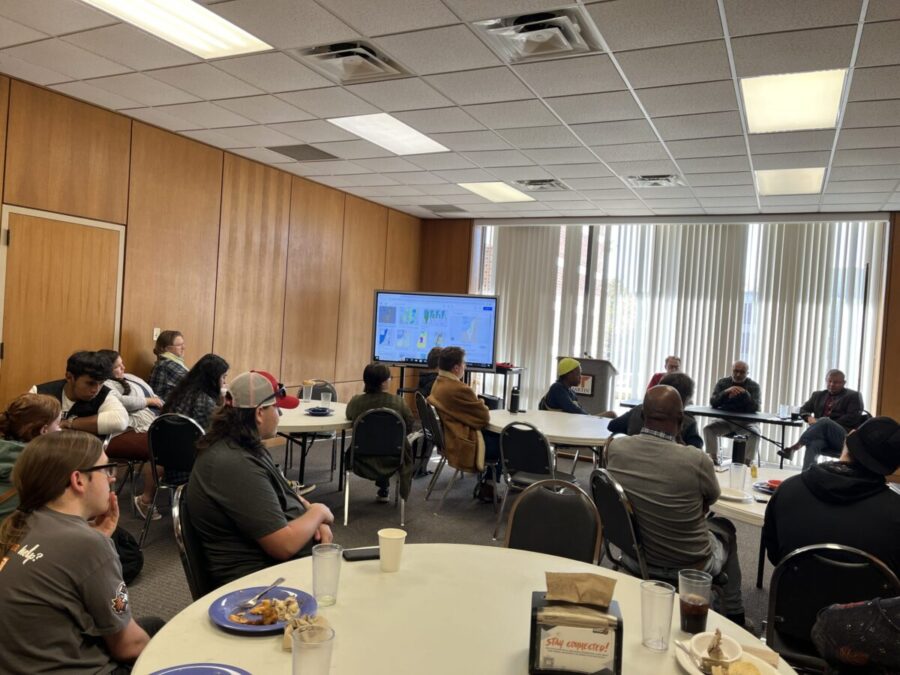UT Martin faculty and students discuss the Israel and Hamas conflict during a recent Engage the Times discussion on campus. | Pacer photo / Jeff Ledington
Engage the Times recently tackled one of the world’s most pressing geopolitical issues.
The popular discussion series hosted by Criminal Justice professor Dr. Tina Lee was held at noon Nov. 10 in the Boling University Center Cafeteria meeting room. Lee welcomed the attendees before introducing the three-member panel: Dr. Daniel Pigg, Dr. Mahmoud Haddad and Dr. Ricky Garlitz. The speakers shared their expertise and personal experiences on the longstanding issue.
Pigg was the first to speak. An English professor and religious scholar, Pigg visited the holy land just before the attack began on Oct. 7, 2023. Pigg spoke of the religious importance in the area and the significance of Jerusalem to the Abrahamic religions. He then gave background for the modern makeup of the area. “The modern Middle East is creation,” he said.
Pigg recounted the early Zionist movement of the 20th century, including efforts to establish a Jewish state in places like Argentina and Uganda. Following World War I, the British Empire took control of the land that would become the nation of Israel from Turkey, itself rising from the former Ottoman Empire. Pig said that the Abrahamic religions lived rather harmoniously in the region before 1948.
“There have been times of harmony, there have been times of strife. Times of strife come from land control,” he concluded.
Next to speak was Haddad, a professor of Finance and a Palestinian born in Jerusalem in 1948. Haddad described life for the Palestinian people as seen through his own eyes. He spoke of how things had changed, especially after the Six-Day War of 1967 regarding Palestinian property being taken.
“… After 1967, no one bought one piece of land,” he said.
Haddad described the difference in how the Palestinian and Jewish people live in the area, detailing checkpoints that only Palestinian travelers need to stop at and being made to travel via donkey or other animal rather than being allowed to use roads.
“There are separations only for the Palestinians,” Haddad said, speaking of areas being restricted to the Palestinian people without military-issued permits.
“You can see it if you visit, you can’t if you don’t,” he said later on the reality of the region.
Pigg added what he’d also seen first-hand. “You can see the power dynamic right on the ground,” he said of the difference between Jewish and Palestinian living conditions.
Haddad maintained a hopeful view of the issues, believing that the Jewish and Palestinian people can live as one. “The people can live together. The politicians and the people who benefit from the separations are the ones that don’t want it to happen,” and later adding, “… life is life, a human being is a human being.” Haddad shared his hope that one day all people can come to live in harmony.
History professor Garlitz touched on the broader political dynamics involved in the region, saying, “It’s a much wider conflict.”
Garlitz spoke of Iran’s support of Hamas and the view of Israel as an illegitimate state. Iran is also connected with Hezbollah, who largely controls Israel’s neighbor, Lebanon. This was contrasted with Egypt, who signed a peace treaty with Israel in 1979 but does not want to allow the Palestinians in Gaza across the border, largely because of relations between Hamas and the Muslim Brotherhood. Egypt also views the conflict as Israel’s problem, caused by continued Israeli expansion in defiance of a United Nations resolution.
Garlitz noted that if Israel were to ultimately push the Palestinian people out of Gaza and the West Bank, “There would be no more two-state solution.”
Haddad backed the point, noting that the Israeli government sees the Palestinian lands “… as Israel” and that neither country wants two states.
Pigg added that the current administration in Israel is “the most conservative in its history.”
As the scheduled end time passed, there was still a full room listening and asking questions, such as how American aid to Israel compares with Iran’s support of Hamas and the role of propaganda in how the conflict is portrayed. Hope and harmony were the ultimate themes of the discussion.


